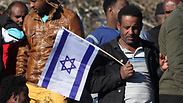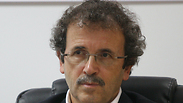This year too, the highest ratings in Israel will not be set by a current event – a political event, a sports event or a cultural event – but by an event which marks the tradition of the past: The Passover Seder.
We are not alone. The story's special status crosses the boundaries of time and place. Many in the world find in it what they care about: The revolution of the liberation of a group of slaves (Martin Luther King, the black leader), a political revolution of creating a nation (Michael Walzer, the Princeton philosopher), yearning for a homeland and autonomy (Theodor Herzl)
or maintaining one's religious identity under harsh conditions (Chazal, our sages may their memory be blessed). It is a pivotal epic which manages to emotionally move everyone in accordance with the context of one's life.
About 85% of Jews in Israel will sit around a table for a ceremonial dinner, like dozens of previous generations have done, focusing on an ancient, unproven story, the ending of which we already know – the Exodus.
Holiday Message
Eritrean and Sudanese asylum seekers joined by human rights activists to conduct alternative Passover Seder in Holot detention center. 'Like the Jews, we also crossed the Egyptian desert, but we are not free here.'
It was so in the past and it is so today. A delicate reading of the Exodus story reveals a love letter sent from previous generations to Israel of the 21st century about the main issue on our national agenda: The need to accept the other, the different, in his different forms.
The ultimate "other" in Israel is a person who is not Jewish – a national minority or a refugee – living among us. The Torah, therefore, engraves the saying "remember that you were a sojourner in the land of Egypt" in the Jewish consciousness.
All People of Israel were others
The hatred felt by Pharaoh and those who "in every generation rise up to destroy us" originates in the Jews' national and cultural difference. In the first generation of the Egypt diaspora, the People of Israel were the brothers of the king's deputy, Joseph, and were therefore accepted generously. Later on, a new king who "did not know Joseph" came to the throne, and the drama began.The lack of knowledge of the other – in Egypt at the time and in Israel today – evolves into alienation and inconsiderate estrangement in the best-case scenario, or even into wariness which sees the other as a threat that must be dealt with.
The shocking command, "Every boy that is born shall be thrown into the river," is made possible when the foreigner's unique face is erased, when we ignore the name given to him by his father and mother, and when he turns, against his will, into part of a demonic group. Let us remember that the foreigner living among us is the person we were in Egypt.
The poor is also "the other" in Israel of 2014. From a commendable welfare state, Israel has turned into a state where every fifth family is considered poor and one-tenth of the population is hungry. Charity organizations try to support the pauper, but the statute book does not offer what should have been obvious – social rights guaranteeing a dignified existence for every person.
The Passover Seder offers an amendment: "Remember that you were a slave in the land of Egypt." Our basic experiences as Jews is inherent in radical poverty of slavery, which is a basic common denominator. We all ate the bread of poverty – matzo. Therefore, at the start of the Seder we renew the social responsibility and call the other, without the financial means, to join us in the intimate circle of the family meal: "Anyone who happens to be in need will come and eat." Let us feel that the poor among us is the person we were in Egypt.
There are some 600,000 disabled people in Israel, who we also perceive, shamefully, as others. In addition to the objective hardships of life, the disabled are forced to function under a stigma. The disability allegedly defines them.
Yet the Exodus teaches us an opposite lesson: The main hero – Moses – was disabled, as a stutterer (like many of the biblical heroes: The blind Isaac, the limping Jacob or the barren mothers). In his stutter, his voice was heard beyond all generations. With broken syllables, he led the people of slaves to freedom. According to our tradition, due to the horrors of the enslavement period, the majority of the people who crossed the Red Sea were lame, blind and missing one or both upper limbs. Let us know that the disabled among us is the person we were in Egypt.
At the beginning of the People of Israel's journey in history, all its sons and daughters were others – persecuted, slaves and disabled. Against this background, the famous demand made in the Passover Haggadah, that "in every generation one must see himself as if he personally left Egypt," receives a deep meaning: Each and every one of us, even if they "belong," must think of themselves as if they are the "other."
It is from the safe and protected Seder table that we are urged to continue the Jewish journey of showing solidarity with the weak and excluded. If we understand that the other is me, the historic salvation of our forefathers will turn into an ongoing salvation for our generation too.
Prof. Yedidia Stern is vice president of research at the Israel Democracy Institute and a professor of law at Bar-Ilan University

'The foreigner living among us is the person we were in Egypt'
Photo: Gil Yohanan

Prof. Yedidia Stern
Photo: Alex Kolomoisky
מומלצים















